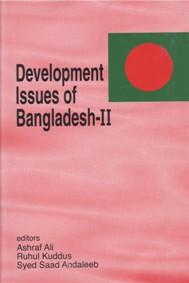
Edited by Ashraf Ali, Ruhul Kuddus and Syed Saad Andaleeb
Published jointly by BDI and UPL (University Press Limited), Dhaka, Bangladesh (in April, 2003)
The book contains articles from a variety of disciplines held together by a common thread: socio-economic development of Bangladesh. The articles are grouped together by their disciples such as political science, social science, science and technology and economics. The contributing authors engage in systematic discussions on country’s political and constitutional issues, causes of poverty and underdevelopment, corruptions and governance. A number of articles deal with the status and prospects of fisheries, water resources, informal and higher education, and steel and engineering technology, while others focus on monetary and banking policies, privatization and effects and implications of globalization.
The book contains data, analysis and policy directions on current issues affecting Bangladesh�s politics, industry, education, economy and so on. Whereas the book is not intended to provide a fully coordinated set of policy prescriptions on current issues, the articles in the book do point to a common set of problems facing Bangladesh such as the domination of rent-seeking class and associated corruption, political instability and violence, lack of well-coordinated economic policies for industrialization, parasitic education system, etc. The solutions suggested in the articles are based on in-depth, objective and comparative analysis of the subject matter and should prove useful to the policy makers and development practitioners.
It contains seventeen articles as listed below:
Table of Contents
Part I: Political Science
Chapter 1: Aspirations and Realities: Parliaments and the Democratic Culture in Bangladesh
By Zillur R. Khan
Chapter 2: Bangladesh Between Promise and Reality: Current Tendencies and Theoretical Explorations
By Ahrar Ahmad
Chapter 3: Images, Belief System and Foreign Policy: Creating a �New Image� of Bangladesh
By Choudhury M. Shamim
Part II: Social Science
Chapter 4: On the Triangular Relationship Between Political Corruption, Gender Inequality, and Socio-Economic Development in Bangladesh
By Ansar Ahmed
Chapter 5: Mapping Rural Women’s Perspectives on Non-formal Education Experiences
By Zebun N. Ahmed
Chapter 6: Teachers and Teaching: Perspectives on Higher Education
By Syed Saad Andaleeb
Part III: Science and Technology
Chapter 7: Fisheries, Aquaculture and Water Resources in Bangladesh
By Ruhul Kuddus
Chapter 8: Regional Cooperation and Integrated Basin Development to Mitigate the Adverse Effects of The Farakka Barrage
By Sufian A. Khondker
Part IV: Economics
Chapter 9: Challenges and Opportunities of Globalization: Policy Options for Bangladesh
By M. Badrul Haque
Chapter 10: An Examination of Some Issues in the Conduct of Monetary Policy in
Bangladesh
By Akhtar Hossain
Chapter 11: Bank Restructuring and Privatization Experience in Bangladesh
By M. Kabir Hassan
Chapter 12: The Political Economy of Higher Education in Bangladesh
By Munir Quddus
Chapter 13: Steel and Engineering and The Diffusion of Technological Capability in Bangladesh
By Farida Chowdhury Khan
Chapter 14: Public Enterprise Inefficiency and The Road to Privatization in Bangladesh
By Tanweer Akram
Chapter 15: An Empirical Study of Life Expectancy in Bangladesh
By Anisul M. Islam
Chapter 16: Migration and Bangladesh�s Economic Development
By Salim Rashid
Chapter 17: Per Capita Income as a Pivotal Index in Economic Development Models
By Ashraf Ali

